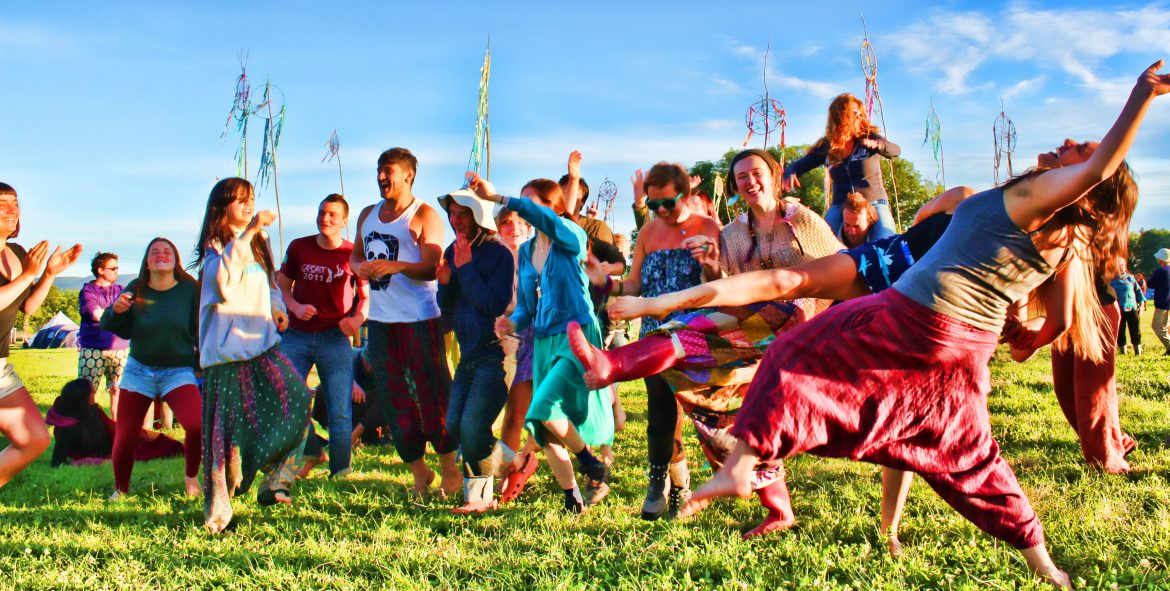We were thrilled to feature Earthsong in our Spring 2020 issue recently. We wanted to share this beautiful article by Ruth Pinson, in which she discusses the values of co-operation, balance and love that the Earthsong founders share. These are the values that will help move us forward as a human society.
Camp Culture
Earthsong as a social enterprise
by Ruth Pinson
Earthsong Camps don’t seem extraordinary, in a culture where making a business out of running workshops or events is becoming increasingly normal. But when they began fifteen years ago, it was a different matter. It took five years before the organisers broke even. Earthsong was the first big event with strictly no drugs, alcohol, electronic music and a late night noise curfew. Fast forward fifteen years and the events are thriving. How do they work? Who pulls them together and where does the money go, if the organisers are still driving around in the same cars? I chat with Ben Coombs and John Bowker, two of the original organising members of the Camps.
It turns out that Earthsong Camps are a social enterprise. This means that they are a business with the primary aim of reinvestment towards social purpose, rather than profit. For most people, a social enterprise is understood to be a business that donates profit to charity. Earthsong Camps are slightly different, in that the organisers see the camps themselves as the social project. They believe that the camps offer a powerful contribution to social and personal wellbeing.
Earthsong Camps seem to have struck a perfect balance. Making the camps bigger by selling more tickets would make a greater profit, but would also compromise the social benefits for those who attend. Over the years, similar camps in the UK have experimented with numbers, and it turns out that 500 seems to be the perfect number for people to recognise each other over the course of the week. This means people can build a sense of familiarity and invest in friendships, whilst also benefiting from the amplified sense of celebration that is possible when hundreds gather at big drum, dance and singing events.
Each camp is comprised of a mix of ticket buyers and people who contribute work in return for their ticket. There are no sponsors and no vendors, so the only income is ticket sales – a rare occurrence at events of this size. Even the onsite café and (nearly all organic) shop are in-house affairs. John explains how this is a big part of what works so well at Earthsong: ‘It’s a great leveller, everyone who is there is a part of the camp.’ Some people have jobs to do, but they’ve all chosen to be there because they want to be part of it, not because they are trying to make money. John believes that this changes the overall feel of the event and includes himself and his fellow organisers in this. ‘People always seem to think that we are either doing it all for nothing, or making a fortune, and the truth is, it’s neither. We make a little bit to cover time and expenses, but it’s not enough to give up the day job. In fact, it’s not even as much as a day job, considering the time we put in’. Ben reminds us that nobody was paid anything until year six. ‘After the first five years of not breaking even, it’s a real pleasure to be able to offer workshop leaders and area co-ordinators a little bit for their time, even if it is just a gesture’ he says.
When questioned further about the real rewards of running the camps, both get a faraway look in their eyes. Ben explains that for him, it is ‘the perfect antidote to our culture’s ills.’ John describes the camps as ‘a rekindling of ancient gatherings’ and talks about how we – as humans – need to get back to basics. There are no celebrities on the field, everyone chops wood and carries water, and everyone is expected to stay on the field and stay the course. ‘Bob Dylan can come if he wants, but he’ll have to camp on the field and chop wood for the fire like everyone else. We have some incredible facilitators and musicians on the field, as well as people who might be quite important in their jobs off the field, but our aim is to continue to level the playing field’. This is most noticeably achieved by having people camp in circles of 15 to 20 people, ranging from babies to older people.
Earthsong Camps allow people a space to appreciate being outside, being with other people and learning new things. One observation that John makes is that these days, people can live very isolated lives. The nuclear family set up can be isolating, particularly for single parent or even single child families. Creating a space for families to parent alongside each other, with the support of older people – some of whom might have already been through the parenting journey – can be really special for everyone involved. ‘There is a real network of friendships that people carry with them throughout the years from the camps. This network of connections allows people to go out and do great work in the world.’
The collective wisdom of campers is revealed through the simple practices of living on the land and getting to know themselves without a phone in their hands.
People need connection. They like to sing, dance, and craft. They like to make friends and notice the moon and the trees and the patterns of the weather. They like to sit by a campfire with a cup of tea, just as they have always done through all of time. By removing the technology and the busyness and other addictive social crutches, the camps simply allow that to happen.


